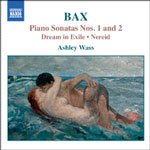
Bax: Piano Music Vol 1 (Includes Sonatas for Piano Nos 1 & 2)
 $25.00
Out of Stock
$25.00
Out of Stock6+ weeks add to cart
ARNOLD BAX
Bax: Piano Music Vol 1 (Includes Sonatas for Piano Nos 1 & 2)
Ashley Wass, piano
[ Naxos / CD ]
Release Date: Sunday 10 October 2004
This item is currently out of stock. It may take 6 or more weeks to obtain from when you place your order as this is a specialist product.
"Ashley Wass's Bax series for Naxos launches in auspicious fashion"
Editor's Choice Gramophone Magazine Oct 2004
Editor's Choice Gramophone Magazine Oct 2004
Gramophone Magazine Award Finalist 2005 - Instrumental
"Arnold Bax is probably best known for his orchestral music - and this year's Gramophone Award for Vernon Handley's magnificent symphony cycle will only add to that impression - but this splendid disc of piano works offers another view of the composer. The two sonatas, written either side of the First World War, are substantial (22-minute) works of considerable musical ambition and Ashley Wass does them proud." (Gramophone)
"This present disk adds to Wass's growing reputation. Bax is not the easiest of composer's to play - either technically or interpretively. He handles all the problems with great skill and force. It is a bold step to embark on a recording of the complete works of this composer and I look forward to the succeeding issues with great interest."
(MusicWeb Sept 2004)
Arnold Bax was one of a group of talented young pianist-composers who emerged from London's Royal Academy of Music in the years immediately after 1900. They included York Bowen, Benjamin Dale and Paul Corder, all pupils of Tobias Matthay for piano and Frederick Corder for composition. At much the same time the pianists Myra Hess, Irene Scharrer, and a little later Harriet Cohen were all Matthay pupils, and of course they played Bax's music. While Bax took many years to make a career, his contemporary York Bowen was an immediate hit both as pianist and composer and appeared at Queen's Hall in his own music while still a student. Yet Bowen's orchestral music is now largely forgotten while Bax is widely known.
Bax wrote in almost all conventional forms excluding opera (though he unsuccessfully attempted opera more than once). With seven symphonies, concertos, many orchestral works including the familiar tone poem Tintagel, choral music, many chamber works, songs and piano music his would eventually be a large output and between the wars at least he was certainly seen as a major figure, a stature rewarded by a knighthood in the Coronation Honours List in 1937. Against his better judgement he became the Master of the King's Musick in 1942 after the death of Walford Davies.
Bax's early life was dominated by the keyboard and in his twenties he appeared in concerts playing his own music. Though not a regular concert pianist such was his pianism that he tended to be called on when others failed. Thus in February 1909 he accompanied Debussy songs in the composer's presence, and in January 1914 did the same for Schoenberg's songs when the booked pianist withdrew at the last minute. But after the First World War he played in public increasingly rarely, although he did make two recordings, of Delius's First Violin Sonata and his own Viola Sonata in May and June 1929. The fire in Bax's romantic pianism is evident in both, with his generous phrasing and left hand articulation, and while Delius is reported as finding Bax's playing too forceful for his music, we might feel it gives it some fibre.
Bax's solo piano music consists of four big-boned sonatas written between 1910 and 1934, and a couple of dozen highly characteristic shorter pieces many of them technically in the shadow of Debussy or Scriabin. There was also the original version, a sonata, of what in 1922 became his First Symphony, and a dozen or so alternative versions of orchestral works, and short late piano pieces unpublished in his lifetime.
Tracks:
Burlesque.
In a Vodka Shop.
Nereid.
Sonata for Piano No 1.
Sonata for Piano No 2.
Dream in exile.
